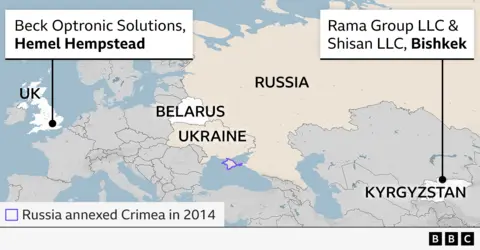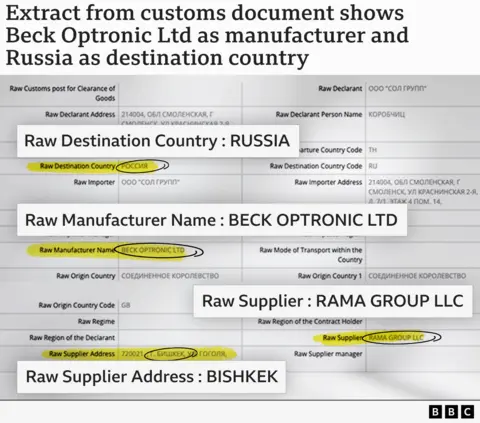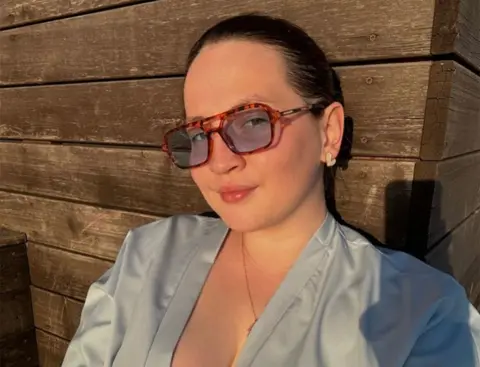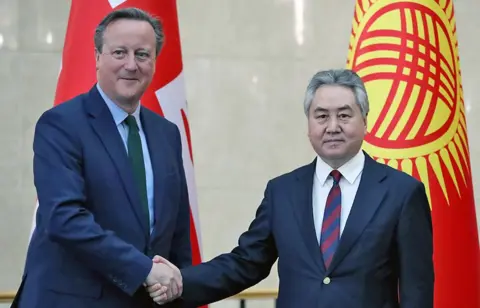UK war tech sent to Russia by Insta model's firm, documents seen by BBC show

High-tech equipment made by a UK firm worth $2.1m (£1.6m) has been sold to companies in Russia connected to the military, customs documents seen by BBC News suggest.
The documents indicate the British-made camera lenses were shipped by a company registered in Kyrgyzstan, apparently run by a swimwear model.
The UK manufacturer, Beck Optronic Solutions, which has worked on British Challenger 2 tanks and F35 fighter jets, told us it had not breached sanctions, had no dealings with Russia or Kyrgyzstan, and was unaware of the shipments.
Our investigation raises questions about the effectiveness of sanctions imposed on Russia since the war in Ukraine began.
The trail led us to Valeria Baigascina, a 25-year-old, originally from the central Asian state of Kazakhstan but now living in Belarus. A part-time model, she posts regularly about her jet-set lifestyle on social media. In the past two years she has visited Dubai, Sri Lanka and Malaysia.
Her social media gave no indication she was also the director of a firm which had channelled millions of dollars’ worth of equipment to sanctioned companies in Russia, as our search of customs documents revealed.
According to Belarusian registration details, Ms Baigascina was the founder and director of a company called Rama Group LLC. Set up in February 2023, it is registered to an address in Bishkek, the capital of Kyrgyzstan - 2,300 miles (3,713 km) from her home in Belarus.
Both countries are former Soviet states with strong trading links to Russia. Belarus remains Moscow’s strongest ally in Europe.

Trade data shows that since sanctions on Russia were introduced in February 2022, UK exports to Kyrgyzstan have increased by more than 300%. Experts suspect some goods are actually destined for Moscow.
The customs documents obtained by the BBC suggest that Rama Group made two shipments to Moscow of high-end optics that can be used in missiles, tanks and aircraft.
The equipment is listed on the customs form as being made by Beck Optronic Solutions in Hemel Hempstead, Hertfordshire. The company manufactures high-precision lenses used in targeting and surveillance systems.
Though some of its lenses are used in healthcare and engineering, Beck’s website details extensive military and defence applications.
The lenses and optical technology sold by Beck Optronics are specifically listed as goods that either cannot be legally exported to Russia, or that need permission from UK authorities before any sale can take place.

The BBC has identified, through customs documents, a total of six shipments of products said to have been made by Beck with a total value of $2.1m (£1.6m) and transferred to Moscow through Rama and another intermediary company, Shisan LLC.
In December 2023 and January 2024, Rama Group made its two shipments to Moscow listing them as “rotating part of camera”. These shipments went to Sol Group, a company based in Smolensk, 200 miles (320km) south-west of Moscow, which has been sanctioned by the US.
It is not clear what international route the goods took - the documents indicate some of the shipments may actually have originated in Thailand.
Shisan LLC, another Kyrgyz company, was responsible for four further shipments of Beck Optronics’ products worth $1.5m (£1.1m).
Two of those shipments involved “short-wave infrared camera lens” and went to the Ural Optical & Mechanical Plant, which makes bomb-aiming equipment and is also sanctioned because of its links to the Russian military.
Rama Group and Shisan share the same address in Bishkek - a modern five-storey block in a prosperous part of the city. However, when we visited we were told Valeria Baigascina was out of the country on a business trip.
We found her number through her social media posts and put our allegations to her.
 Instagram
InstagramMs Baigascina said she was the founder of the company but had sold it in May. She denied the allegations, saying that when she had owned it, “nothing like that was supplied”. She then hung up.
Later, by email, she told us the accusations were “ridiculous” and based on “false information”.
Our research shows that in May this year she sold Rama Group to her best friend, Angelina Zhurenko, who runs a lingerie business in Kazakhstan.
Ms Zhurenko told us: “Trading activities are carried out exclusively within the framework of the current legislation of Kyrgyzstan. The company does not violate any prohibitions. Any other information is false.”
 Instagram
InstagramThe director of the other intermediary company, Shisan, is listed as Evgeniy Anatolyevich Matveev. We put our allegations to him by email.
He told us that our information was “false” and that he ran “a business supplying exclusively civilian goods manufactured in Asian countries”.
He continued: “This does not contradict the laws of the state in which I work, and has nothing to do with US sanctions, because it is impossible to prohibit free trade in Asian goods available for sale and delivery.”
There’s no evidence that Beck Optronics knew about these shipments or that the final destination of the lenses was Russia.
The company told us it had nothing to do with the shipments: “Beck has not shipped anything contrary to UK export controls or any sanctions applying in the UK. It has had no dealings with any party or company in Russia, Kyrgyzstan or Thailand, was not aware that any shipments might ultimately be destined for any of these destinations and has not shipped anything to these destinations.”
It believes some of the equipment listed wasn’t even made by the company and that customs documents may have been falsified.
But these alleged exports are part of a much bigger picture involving shipments from a number of sources.
Analysis of customs documents by the Washington-based security think tank C4ADS suggest that Shisan completed 373 shipments via Kyrgyzstan to Russia between July and December 2023.
Of these, 288 contained goods that fall under customs codes for “high-priority battlefield items”.
Over the same six-month period, Rama Group completed a total of 1,756 shipments to Russia. Of these, 1,355 were for items on the “high-priority battlefield items” list.
Its most recent shipments, including electronics by US and UK companies, went to a Russian company named Titan-Mikro, which has been subject to US sanctions since May 2023 for operating within Russia’s military sector.
“When they sell this technology to a client who is potentially a Russian end-user, they fully should understand that this is to kill people,” says Olena Tregub from NAKO, Ukraine’s independent anti-corruption organisation.
She warns that the holes in the sanctions regime are costing lives.
“Without those technologies, those weapons would not fly. The brain of those ballistic missiles, the brain of those kamikaze drones, are made of Western technology,” she says.
 Getty Images
Getty ImagesInternational authorities are aware of Kyrgyzstan’s role in sanctions evasion.
In April, UK’s foreign secretary at the time, David Cameron, travelled to Bishkek and urged the Kyrgyz authorities to do more to tighten their sanctions' compliance.
The Kyrgyz president expressed confidence that Lord Cameron’s official visit to his country would “give new impetus to multifaceted co-operation between Kyrgyzstan and the UK”.
David O’Sullivan, the EU’s Special Envoy for the Implementation of Sanctions told us that efforts continue to shut down “illicit procurement networks”, and that “companies are required to undertake due diligence checks to understand who is the final end-user and where ‘battlefield items’ end up ultimately”.
Source: BBC
























































